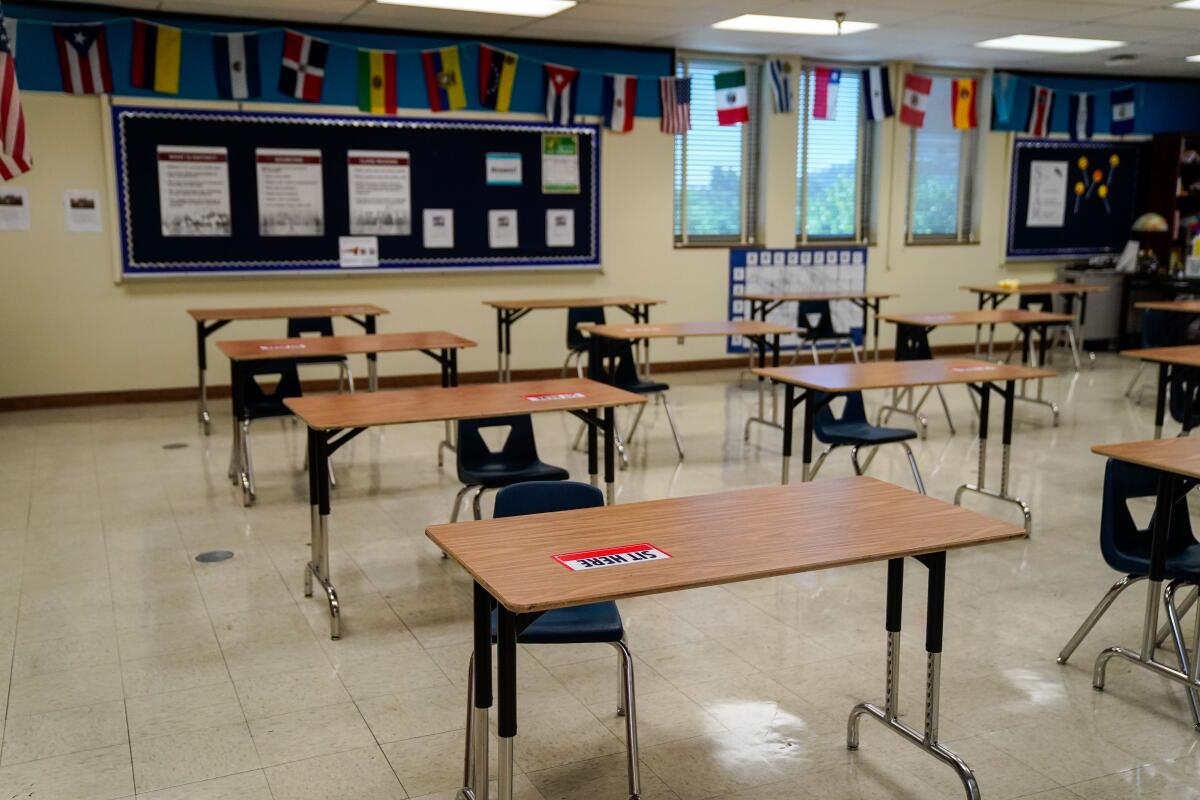Endorsement: Scott Schmerelson and Tanya Ortiz Franklin for L.A. Unified school board

- Share via
The COVID-19 pandemic has transformed how schools locally and across the nation carry out their mission, but when it comes down to Los Angeles Unified school board elections, things look the same as they have for a long time: It’s the pro-reform group that favors charter schools versus the allies of United Teachers Los Angeles.
Independent-minded candidates who will consider the separate merits of each situation are hard to find, and it’s even harder for them to draw enough financial support to win. As a result, there have been too many problematic board decisions that have depended more on ideology than common sense. For example, take the iPads-for-all program that quickly bombed. Or the attempts to reject even excellent charter schools. Or the requirement that students get at least a C in all their college-prep courses to graduate high school, an exercise in grade inflation that also quickly fell apart.
Those issues look small, now that the pandemic has turned public education on its ear. The antiracist movement is having its own profound effects, as it should. Juggling priorities in the nation’s second-largest school district, with students struggling under remote learning, schools burdened by high COVID-related expenses, and teachers fearful of returning to physical classrooms, isn’t a task for the uninitiated. It requires ideas, a strong sense of L.A. Unified’s vast operations and utter dedication to students’ welfare.
The school board has two seats to fill. In one, incumbent Scott Schmerelson, more closely aligned with the teachers union, faces challenger Marilyn Koziatek, backed by charter-school advocates.
The other seat is being vacated by longtime board member Richard Vladovic, who often acted as a swing vote on the board. There, a candidate strongly backed by labor is vying with one who is endorsed by reform-oriented leaders.
District 3: Scott Schmerelson
Schmerelson, a former principal, was our pick in the primary, and his experienced hand in the district is more valuable now that schools are in crisis mode. Though he is a generally reliable ally of the teachers union, Schmerelson has voted for his share of charter schools. He has the practical, down-to-earth viewpoint of a veteran, and recently voted against a hasty decision to dramatically defund the LAUSD police force before the district had even figured out what its safety needs were.
Koziatek is a parent and community outreach manager for Granada Hills Charter School. Her main interest is in bringing the practices that work at Granada Hills to the district at large. That’s an understandable approach but a naïve one that doesn’t take into account the differences between that school and most others in the district. Methods that work in one school have generally not transplanted all that successfully.
At the same time, we encourage Schmerelson, should he win, to take a broader view of student needs. He has tended to think narrowly about the area he represents, which is one of the less disadvantaged parts of the school district. The reopening will call for more concern about what’s right for all students, especially the ones who have faced the greatest obstacles during the pandemic.
District 7: Tanya Ortiz Franklin
Voters in this district, which stretches from South L.A. to San Pedro, missed a chance in the primary. Silke Bradford, a longtime educator, was an independent-minded candidate with creative and practical ideas that didn’t fit neatly into any ideology. But in L.A. Unified, such candidates almost never garner the financial backing needed to get voters’ attention. It’s a shame, and it’s L.A. Unified’s loss.
The top vote-getters in the primary were Patricia Castellanos, economic development deputy for L.A. County Supervisor Sheila Kuehl, and Tanya Ortiz Franklin, a former teacher laid off during the recession, now senior director at the Partnership for L.A. Schools, a nonprofit that runs 19 schools within L.A. Unified under an agreement with the district.
Castellanos has the support of the Democratic political establishment as well as labor unions galore, while Franklin has just a handful of endorsements from the reform side. Though their alliances are clear, neither voices particularly strong ideologies. Both are likable and have a good sense of the issues facing the district.
Franklin, though, addresses those issues in a more specific, informed and energetic way. She’s deeply concerned about teacher safety during a future return to school and understands the tremendous work many of them are putting in to try making remote education work, but she’s also deeply worried for the 7,000 L.A. Unified students who still lack computers to work from home and wants to see that problem resolved immediately. She has good ideas about how to bring small numbers of high-needs students back on campus, with teachers who volunteer for the work.
She unfortunately is a believer in a C-grade requirement for graduation. That would put enormous pressure on teachers to give a C to students who don’t deserve it. Fix instruction and learning first; the higher grades will follow.
Castellanos had far more trouble articulating any specific vision or ideas about how to confront the challenges facing the schools and took a more leisurely view of the 7,000 students without computers. If there was ever a time that called for urgency on behalf of all students, this is it.
More to Read
A cure for the common opinion
Get thought-provoking perspectives with our weekly newsletter.
You may occasionally receive promotional content from the Los Angeles Times.










